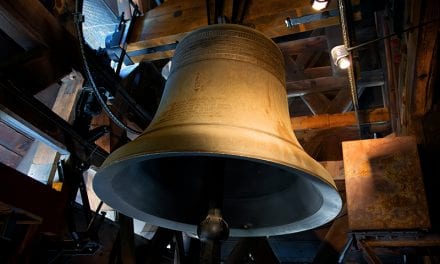It was Spring 1959, and I lay there on the living room couch with my measles to keep me company. Meanwhile, “Come Softly to Me” by the Fleetwoods, hypnotized me with that “Dom, dom, dom, dom bi doo bee doo” intro. Incredibly gentle and sweet. I had never heard anything like it, like sea sirens calling out to a brokenhearted young innocent, who answered in halting fashion. There were a lot of other great songs that year, but the other one that got people singing along was Lloyd Price’s “Stagger Lee, truly the most rocking upbeat song you ever heard about a killing.
My family lived in the West Farms section of the Bronx those days. A lot of famous people lived in the Bronx then, like Ralph Lauren. And Burt Lancaster, well at least he went to my high school, DeWitt Clinton. That’s about it for all the Bronxography I can think of right now. Sorry. Our apartment building had two addresses, and two entrances, one on 178th Street and the other on Vyse Avenue. I always wondered if it confused the mailman or gave him extra work. He must have hated our guts. Anyway, I thought it was cool, especially since the roof of our building bore a crown facing out the edge of every section, and we were at the top of a hill.
Still, if you wanted to buy fireworks in the beginning of summer, you’d have to go up to Gunhill Road. Why? I don’t know. But that was the word. From late spring to early fall, you could count on stickball games taking place between the older teenagers, young hero types as far as we knew. I remember these contests often being held between the 178th Street Boys and the Vyse Guys, the last team sporting a clever rhyming Yiddishism that I loved. They scratched the score out with white chalk in the black asphalt gutter. All went well until the cops would show up. Then, the broom stick would get shoved under a car in the street as fast as rat poison. That was till the cops left or found the stick.
The daily grind in my neighborhood has its own commercial rhythm, especially in summer, with the predictable visits of the ice cream truck, the coal truck with a coal shoot for basement deliveries of the filthy gleaming black stuff through a building’s basement street-facing window, even a junk wagon pulled by a tired old horse, and a miniature carousel for the kiddies on the rear platform of a short track. The guy who ran that last gig always seemed to be looking to pinch a few young moms’ bottoms in exchange for giving their brats a little more carousel time. Oh yeah, there was the water truck that shot powerful jets of water under the cars up against the curb of the sidewalk, and if you ran between the cars where there was a decent parking spot and could stay caught up with the truck, the rush of water up against your ankles was truly exhilarating. Just watching all this was a pure, if not primitive, pleasure.
My mom would hang out laundry to dry on a line from our kitchen window to a pole on the other side of the back yard. From time to time, an old man, maybe it was two different old men, would come around to the back yard with a cart and yell up the housewives, “Knives and scissors sharpened.” Other times it was, “Cash for clothes.” This seemed like the grimiest calling in life. I would rather have been a bus driver or a fireman, or, if I had my druthers, work in the post office.
We lived on the ground floor, Apt. B6. Just above us lived an Egyptian family named Esfarim. Coptics, I’d venture. The couple had two girls, fraternal twins named Farah and Yasmin. They were about 11 years old at the time, but somewhat precocious in their physical development.
My mother always regarded the Esfarim family as “tsiganers,” gypsies in English, another form of “prosteh menschen,” a.k.a. low-class people. This was reinforced in her mind by the fact that they were Egyptians, and carelessly let their bathroom tub overflow a number of times, which flooded down through our hall closet. Before coming to America, these people or their ilk must have been farmers on the Nile, who had to suffer annual seasonal floods. Hence, they must had harbored a sense of helplessness when dealing with large quantities of water as a force of nature that they never learned that it could be controlled with a simple turn of the faucet at a timely moment.
So, one day during my measles and listening to “Come Softly to Me” for about the eleventh time, while pining for Penny Lurie, a crush that eventually lasted through my junior high school years, Farah and Yasmin came downstairs to pay me a sick call. A bit strange since up to then they never really bothered with me. They had some kind of grievance between them that only a neutral third party could resolve. They disagreed lately about who had bigger bubbies, and this had to be decided by me, according to them. Okay, I was all in. First, Farah pulled up her sweater and showed me her two mounds. Nice, nice. As expected. Then, Yasmin went. Oh yes, yes. And unexpectedly hers seemed just as large as Farah’s, even though she was a slimmer girl. When it came time for my verdict, which was expected within a few seconds, I responded honestly that it was too close to call, and that I could not tell. This set them jabbering angrily. Then, inspiration hit me. After all, I didn’t want to aggravate the ill feeling that was now swirling about.
“Look, it’s not fair,” I pleaded. “Let me see again. I’m sure I can then decide.”
So that’s just what they did, showing me their bubbies again, each seemingly expecting the hard- fought blue ribbon prize.
Again, I honestly couldn’t make up my mind, but very happy to get two views of four different bubbies. All in the space of less than five minutes.
But this time I lied about my certainty and announced grudgingly, “I think Yasmin’s is a bit, just a bit farther out. It’s still pretty close.”
This earned me a nasty glare from Farah, when they both immediately marched out, Yasmin holding her chin high in triumph, having beat her sister by the tiniest increment in this important contest on the road to womanhood.
Later that same year, my family grew tired of the periodic floods from the Egyptian tsiganers as they were now forever condemned by my mother. Yes, the very same family of the tit-contesting sisters. The last flood had become intolerable for Mom. We were a proud people who could no longer stand being rained upon with these people’s bath water. We didn’t live down river on the Nile from them, after all. So, Mom goaded my father into doing something about it. My mother, as many women in those days who had not yet entered the legal profession, was a pretty good goader. She conferred with her cousin, Jolnayi, who suggested going to small claims court. My father, also an immigrant, was not used to the American habit of suing your neighbor over a disagreement. He checked with his friend, Max, who he pronounced “Mex.” And it was a go.
Jolnayi, got another relative of his, a lawyer, to help my parents prepare the case. He could not speak for them as small claims was regarded as “the people’s court,” and lawyers were not welcome there. He advised my parents to show “tangible damages” to their clothes and the closet, and made a few suggestions in that direction, that is if my parents wanted to collect some money and teach these people a lesson so they would stop flooding us. So, into court came my parents with several older garments in a bag they had not worn for years, which they had sprinkled with a little water and plaster of Paris, and with several photographs of the inside of our closet.
After a brief trial, the judge awarded my parents $116 in their favor. Coming home from court, my parents were delirious with joy. They had gotten a money judgment, and the lawyer refused to take any fee, saying he had helped out because of “family obligation.”
A few days later, when my parents were both home, there was a knock on the door from Mr. Esfarim, Farah’s and Yasmin’s dad. I had seen him a few times. He wore a suit to work, and carried an attaché case. I figured he was an insurance salesman to the Egyptian immigrant community, or some clerk who wouldn’t be caught dead with his lunch in a brown paper bag, or a lunch pail like some blue collar Joe.
Anyway, he and my father had some kind of pow-wow at the door, which took long enough to have gotten interesting. When Dad said good night to Mr. Esfarim, Mom was good and curious. The conversation went along the lines of an intense interrogation.
Mom: “So?”
Dad: “Okay, it’s done. Forty-four dollars! He paid me at the door.”
Mom: “Forty-four dollars? That’s it?”
Dad: “That’s it.”
Mom, resigned but still curious: “So what did he say? What did you say?”
Now, Dad loosened up a bit: He said that’s all he could afford at this point, and that he could pay me the balance over the next three weeks. I told him that the forty-four dollars was fine, and he could forget about the balance, and it was really about the floods. He thanked me and said he would make sure with his wife that there would be no more floods.
Mom: “Sooo, you’re happy with that?”
Dad: “Yep! I’m not a shopkeeper or a bill collector. This man has his self-respect and I have mine. That’s it. No more!”
It was Mom’s turn to sit down, as if gaining a new appreciation, or at least understanding, of her husband. All she said after that was, “Okay, okay. But there better not be any more floods.”
And so we came to regard ourselves as belonging to that group of people known as “behsere menschen,” or quality folk in English. My father was now a man of stature, a true American having sued his neighbor, and no low money grubber, and I, unbeknownst to my family, a junior bubbie judge.
Forty-Four Dollars by Gene Goldfarb




















